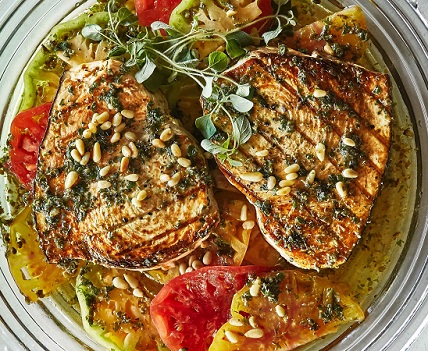Grilled Swordfish
Grilled swordfish is a dish that embodies the essence of Mediterranean cuisine – simple, fresh, and bursting with flavor. Swordfish, with its firm texture and mild, slightly sweet taste, is perfectly suited for grilling. When prepared correctly, it offers a delightful combination of a lightly charred exterior and a moist, tender interior.
Swordfish, also known as broadbill in some countries, is a large, predatory fish found in temperate and tropical oceans worldwide. Its name comes from its distinctive bill, which resembles a sword.
This impressive fish has been prized by cultures around the Mediterranean for centuries, not only for its culinary value but also for the challenge it presents to fishermen.
The beauty of grilled swordfish lies in its versatility. It can be prepared with minimal seasoning to let its natural flavors shine, or it can be paired with bold marinades and sauces. In this recipe, we’ll explore a classic preparation that highlights the fish’s inherent qualities while adding a Mediterranean flair with lemon, herbs, and olive oil.
Grilling swordfish is an art that requires attention to detail. The key is to achieve that perfect balance where the fish is cooked through but still moist.
Overcooking can quickly turn this prized catch into a dry, unappetizing meal. But fear not – with the right technique and timing, you’ll be able to create a restaurant-quality dish in your own backyard.
Whether you’re hosting a summer barbecue, preparing a special dinner for two, or simply looking to incorporate more fish into your diet, this grilled swordfish recipe is sure to impress. Let’s dive into the ingredients and method for creating this delicious Mediterranean-inspired dish.
Ingredients:
- (Serves 4)
For the swordfish:
- 4 swordfish steaks, about 6 oz (170g) each and 1-inch thick
- 2 tablespoons extra virgin olive oil
- 1 lemon, zested and juiced
- 2 cloves garlic, minced
- 1 tablespoon fresh oregano, chopped
- 1 tablespoon fresh thyme leaves
- Salt and freshly ground black pepper to taste
For the herb sauce:
- 1/4 cup extra virgin olive oil
- 2 tablespoons fresh lemon juice
- 1 tablespoon capers, drained and roughly chopped
- 2 tablespoons fresh parsley, finely chopped
- 1 tablespoon fresh basil, finely chopped
- 1 small shallot, finely minced
- 1 clove garlic, minced
- Salt and freshly ground black pepper to taste
For serving:
- Lemon wedges
- Fresh herbs for garnish (optional)
How to Make:
Prepare the swordfish:
In a small bowl, mix together the olive oil, lemon zest, lemon juice, minced garlic, oregano, and thyme.
Place the swordfish steaks in a shallow dish and pour the marinade over them, making sure to coat both sides.
Cover and refrigerate for 30 minutes to 1 hour. Avoid marinating for longer as the acid in the lemon juice can start to “cook” the fish.
Make the herb sauce:
While the fish is marinating, prepare the herb sauce.
In a small bowl, combine the olive oil, lemon juice, capers, parsley, basil, minced shallot, and garlic.
Season with salt and pepper to taste.
Set aside to allow the flavors to meld.
Preheat the grill:
If using a gas grill, preheat to medium-high heat (about 400°F to 450°F).
If using a charcoal grill, light the charcoal and wait until the coals are covered with gray ash and the temperature reaches medium-high heat.
Grill the swordfish:
Remove the swordfish from the marinade and pat dry with paper towels.
Season both sides with salt and pepper.
Oil the grill grates to prevent sticking.
Place the swordfish on the grill and cook for about 4-5 minutes per side, or until the fish is opaque throughout and has nice grill marks.
The internal temperature should reach 145°F (63°C) when measured with an instant-read thermometer.
Serve:
Transfer the grilled swordfish to serving plates.
Spoon the herb sauce over each steak.
Garnish with lemon wedges and additional fresh herbs if desired.
Serve immediately while hot.
Chef’s Notes:
Selecting swordfish: Look for firm, moist-looking steaks with a pinkish-beige color. Avoid any that appear dry or have brown spots. Sustainable choices are important, so opt for line-caught or harpoon-caught swordfish when possible.
Thickness matters: Try to choose swordfish steaks that are about 1-inch thick. This allows for a nice sear on the outside while keeping the inside moist. If your steaks are thicker, you may need to adjust the cooking time accordingly.
Don’t overcook: Swordfish can quickly become dry if overcooked. It’s done when it’s just opaque throughout. If you’re unsure, it’s better to err on the side of slightly undercooking, as residual heat will continue to cook the fish after it’s removed from the grill.
Grilling alternatives: If you don’t have access to a grill, you can use a grill pan on the stovetop or even broil the swordfish in the oven. Just be sure to adjust cooking times as needed.
Marinade variations: Feel free to experiment with different herbs and spices in your marinade. Rosemary, dill, or cilantro can be great alternatives or additions. For a spicier version, add a pinch of red pepper flakes.
Serving suggestions: Grilled swordfish pairs well with a variety of side dishes. Consider serving it with a Greek salad, grilled vegetables, or a light orzo pasta salad for a complete Mediterranean-inspired meal.
Wine pairing: A crisp white wine like a Sauvignon Blanc or a light-bodied Pinot Grigio complements the flavors of the grilled swordfish beautifully. For red wine lovers, a light Pinot Noir can also work well.
Leftover ideas: If you have leftovers, consider flaking the cold swordfish and using it in a salad or sandwich the next day. Just be sure to consume within 1-2 days for the best quality and safety.
Nutritional Value: (Per serving, based on 4 servings)
Please note that these values are approximate and can vary based on specific ingredients and portion sizes:
- Calories: 350-400 kcal
- Total Fat: 22-26g
- Saturated Fat: 4-5g
- Monounsaturated Fat: 14-16g
- Polyunsaturated Fat: 3-4g
- Cholesterol: 65-75mg
- Sodium: 200-250mg
- Total Carbohydrates: 2-3g
- Dietary Fiber: 0-1g
- Sugars: 0-1g
- Protein: 35-40g
Grilled swordfish is a nutritious choice that offers several health benefits:
High-quality protein: Swordfish is an excellent source of complete protein, providing all essential amino acids necessary for muscle growth and repair.
Omega-3 fatty acids: While not as high in omega-3s as some other fish like salmon, swordfish does contain these beneficial fats, which are important for heart and brain health.
Vitamins and minerals: Swordfish is rich in:
Vitamin D: Important for bone health and immune function
Vitamin B12: Essential for nerve function and the formation of red blood cells
Selenium: An antioxidant that supports thyroid function and helps protect cells from damage
Potassium: Crucial for heart function and blood pressure regulation
Zinc: Important for immune function and wound healing
Low in calories: Compared to many protein sources, swordfish is relatively low in calories, making it a good choice for those watching their calorie intake.
Low in carbohydrates: This dish is very low in carbohydrates, making it suitable for low-carb or ketogenic diets.
It’s worth noting that while swordfish is nutritious, it’s also known to contain higher levels of mercury compared to many other fish. For this reason, health authorities often recommend limiting consumption, especially for pregnant women, nursing mothers, and young children. The FDA suggests adults eat 4-6 oz of swordfish no more than once a week.
The olive oil used in this recipe provides additional health benefits, being rich in monounsaturated fats and antioxidants. The fresh herbs not only add flavor but also contribute small amounts of vitamins and antioxidants.
As with any dish, this grilled swordfish should be enjoyed as part of a balanced diet. Its high protein content and beneficial fats make it a satisfying meal that can support various health goals when consumed in moderation.
Thanks for visiting Seafoods Recipe

